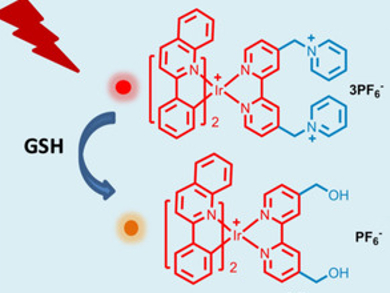Photodynamic therapy has become a promising method for cancer therapy due to its minimal invasiveness and high selectivity. However, irreversible damage to normal tissues cannot be avoided during photodynamic therapy. Hence, it is important to develop smart photosensitizers that can recognize cancer cells and improve photodynamic therapy effectivity.
Shujuan Liu, Qiang Zhao, Nanjing University of Posts and Telecommunications (NUPT), China, Wei Huang, NUPT and Northwestern Polytechnical University (NPU), Shaanxi, China, and colleagues have developed a series of smart photosensitizers based on iridium(III) complexes equipped with pyridinium analogues. The pyridinium derivatives can be converted to benzyl alcohols in the presence of glutathione (pictured). This reaction is accompanied by an enhancement of the luminescence of the complex and an overall improvement of the photosensitizer properties.
Since the levels of glutathione are usually higher in tumor tissues, the smart complexes can differentiate cancer from normal cells and selectively enhance photodynamic therapy in cancer cells to avoid side effects. According to the researchers, this work provides a new approach for the design of smart and responsive therapy systems that avoid nonspecific damage in photodynamic therapy.
- Rational Design of Phosphorescent Iridium(III) Complexes for Selective Glutathione Sensing and Amplified Photodynamic Therapy,
Tianci Huang, Qi Yu, Shujuan Liu, Kenneth Yin Zhang, Wei Huang, Qiang Zhao,
ChemBioChem 2018.
https://doi.org/10.1002/cbic.201800507



